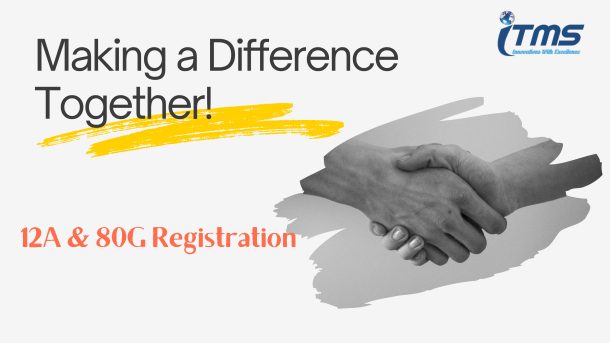Non-profit organisations (NGOs, Trusts, Societies, Section 8 Companies) play a crucial role in India’s development by addressing issues of education, healthcare, poverty alleviation, women empowerment, and environmental sustainability. To support their efforts, the Income Tax Act, 1961 provides significant benefits through 12A and 80G registrations.
- 12A registration exempts NGOs from paying income tax on their charitable income.
- 80G registration allows donors to claim tax deductions on their contributions, making donations more attractive.
Since the Finance Act, 2020, the system of approvals has been restructured into provisional and permanent registrations. Understanding this framework is essential for NGOs to remain compliant, gain credibility, and build long-term sustainability.
This guide covers:
✅ Difference between provisional and permanent registration
✅ When NGOs should shift from provisional to permanent registration
✅ Legal requirements, eligibility, and application process
✅ Ongoing compliance under 12A and 80G
What is 12A Registration for NGOs?
- 12A registration provides a tax exemption to NGOs.
- Without 12A, the organisation’s income is taxable like any other business entity.
- This ensures that maximum funds are applied toward the NGO’s objectives instead of being diverted to taxes.
What is 80G Registration for NGOs?
- 80G registration provides tax benefits to donors.
- Donations to an 80G-approved NGO qualify for 50% or 100% deduction from the donor’s taxable income.
- This significantly improves an NGO’s fundraising ability by encouraging more donations.
Provisional vs. Permanent Registration under 12A & 80G
Provisional Registration
- Granted to new NGOs or those yet to start activities.
- Validity: 3 years.
- Application: Form 10A through the Income Tax portal.
Permanent Registration
- Granted to NGOs that have commenced genuine charitable activities.
- Validity: 5 years (renewable).
- Application: Form 10AB.
When Should an NGO Shift from Provisional to Permanent Registration?
This is one of the most common questions NGOs face.
📌 An NGO must apply for permanent registration in Form 10AB, whichever is earlier:
- Within 6 months from the commencement of charitable/religious activities, OR
- At least 6 months before the expiry of provisional registration (3 years).
Example:
- Provisional approval granted in April 2024 (AY 2025–26).
- If activities start in January 2025, apply for permanent registration by June 2025.
- If no activities start, apply by September 2026.
⚠️ If this deadline is missed, the provisional registration lapses, and the NGO must restart the process with Form 10A.
Eligibility for 12A & 80G Registration
NGO must be a legally registered Trust, Society, or Section 8 Company.
- Objectives must fall under the definition of charitable purpose (Section 2(15) of the IT Act), including:
- Relief of the poor
- Education
- Medical relief
- Preservation of the environment and monuments
- Advancement of the general public utility
- For 80G: NGO must not engage in activities benefiting a particular caste or religious community.
Documents Required for Registration
- Trust Deed / Memorandum of Association / Certificate of Incorporation
- PAN card of NGO
- Details of Trustees / Office bearers
- Bank account details
- Activity report (for permanent registration)
- Audited financial statements (if applicable)
Compliance Requirements After Registration
For 12A Registered NGOs
- Apply at least 85% of income for charitable purposes in India.
- Get accounts audited and file Form 10B if income exceeds the exemption limit.
- File ITR-7 annually.
- Maintain separate books of accounts for incidental business activities.
For 80G Registered NGOs
- File Form 10BD (donor statement) by 31st May each year.
- Issue Form 10BE to donors for tax deduction claims.
- Maintain transparent donation and utilisation records.
Grounds for Cancellation of Registration
- Failure to apply income for charitable purposes.
- Carrying out non-genuine or commercial activities.
- Favouring a particular caste/community (for 80G).
- Non-filing of ITR or donor statements.
Benefits of 12A & 80G Registration
- 12A: Income tax exemption, eligibility for government grants, and enhanced credibility.
- 80G: Donor attraction, increased fundraising opportunities, and tax benefits to donors.
Frequently Asked Questions (FAQs)
1. Can a new NGO directly apply for permanent registration?
👉 No, new NGOs must first apply for provisional registration.
2. How long does it take to get registration?
👉 Generally 1–3 months, subject to Income Tax Department approval.
3. Can 12A and 80G be applied together?
👉 Yes, NGOs usually apply for both simultaneously through Form 10A.
For NGOs in India, 12A and 80G registrations are not just legal
compliances, but strategic tools for sustainability. Provisional registration allows new organisations to start, while permanent registration ensures long-term benefits. Timely transition from provisional to permanent is critical, along with strict adherence to compliance, such as filing returns, audits, and donor reporting.
📌 In the next article, we will cover FCRA Registration, a must for NGOs receiving foreign contributions.
For 12A & 80G or FCRA Registration and other legal support, feel free to email me at Hari4Legal@gmail.com.





